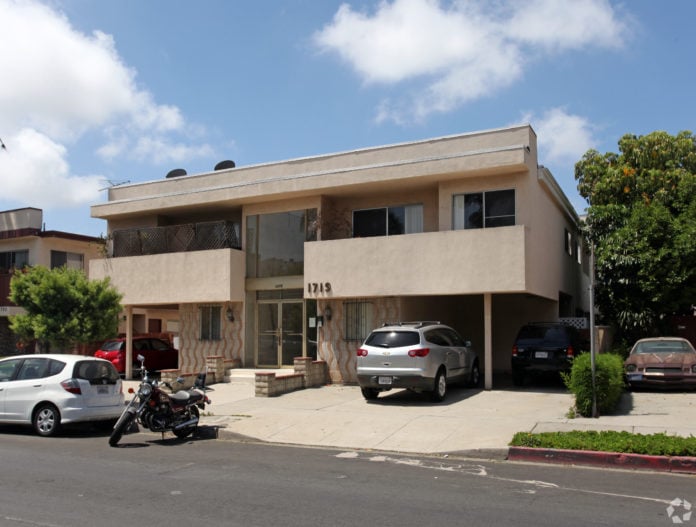And while the company has felt some sting from the coronavirus pandemic, MJW has shown resiliency during 2020 and appears poised for growth in 2021.
To date, the company has acquired more than 5 million square feet of real estate investments and has a transaction volume of more than $1 billion.
Its portfolio has nearly 1,000 multifamily units and 5,000 student housing beds in eight states.
MJW’s portfolio is currently valued at roughly $850 million.
Mark Weinstein founded the firm in 1983 while he was still in law school, and he convinced a few students to give him money for a housing property.
“I saw that income-producing properties could be a very profitable way to build wealth,” Weinstein said.
He continued to invest in real estate during a two-year run as a lawyer before deciding to go into real estate full-time.
Weinstein began converting old buildings to lofts and retail in Old Town Pasadena and developed projects downtown, including the more than $100 million Santee Court multifamily project.
In the 2000s, MJW began to invest in student housing.
Weinstein said the company now has student housing near 10 universities, including Arizona State University, UC Santa Barbara and Michigan State University.
“All of them are major universities, Division 1 with great sports programs, and the projects are all close to campus,” he said. “My thesis with student housing is that if you have a major university … I figured that people would always want to be there. During tough times when there’s not a lot of jobs, people stay in school.”
A different downturn
A different downturn
Still, the company’s student housing portfolio has performed well. He said 96% of rent is still being collected, and many students, even those who went home for a while, have come back.
The company offers 12-month leases with parental guarantees. It allowed some people to exit their leases, “but for the most part, we’ve collected and made pretty good progress with leasing next year.”
Weinstein thinks the markets he is in will allow these properties to continue to do well because people want to be in those locations.
MJW isn’t alone in its interest in student housing. In March, downtown-based property management company Ashland Pacific Management Inc. and West Los Angeles-based Integrated Capital Management announced a $150 million joint venture, dubbed Ashland Pacific Integrated.
The JV was formed to acquire and manage student housing on the West Coast.
Annual student housing investment volume has more than tripled since 2014 to $11 billion a year, according to a CBRE Group Inc. report.
Although student housing has outperformed the traditional multi-family sector, according to Weinstein, MJW still has substantial holdings in multifamily housing.
At one point, Weinstein said collections on multifamily housing properties were at 90%, a number that has since climbed to 94%.
On the down side, Weinstein said the portfolio has lower rents and more vacancy now than it did before Covid.
And some projects that were in the works, including a rehab of 30 units in Seattle, were put on hold due to the pandemic.
Weinstein added that eviction moratoriums gave some people the wrong idea.
“People only heard the message you don’t have to pay. It was tricky for a while,” he said, adding that while some people truly couldn’t pay the rent, others that could were choosing not to.
Some tenants moved out of the properties.
“We were having way more vacancies, and there was a huge rent loss and rental rate decline, especially in single apartments,” Weinstein said.
Opportunistic investing
Opportunistic investing
The fund, which was initially expected to reach $300 million, was expanded due to high investor demand.
Weinstein said MJW has been actively looking at opportunities but has run into some difficulties.
“We make lots of offers and aren’t successful because the prices aren’t realistic,” he said.
Weinstein added that some sellers have been shocked by offers for less than pre-Covid asking prices.
For Weinstein, prices have to be lower as economic stimulus is running out for many, and some who are still paying rent may not be able to in the long run.
CBRE expects that nationally the rental rate will decline by 8.8% this year, and the vacancy rate will rise by more than 3 percentage points. The market is projected to recover in 2021 and 2022.
For Weinstein, current decreases mean prices are not where they should be.
“Prices are too high. There has not been price discovery yet. The sellers and buyers are too far apart,” he said. “I don’t think (sellers) have adjusted to reality yet.”
Most of the offers he has made have been for multifamily, not student housing properties.
And the company is looking at a handful of markets.
“Going forward, we have a bunch of markets that we are looking at. We are looking at Texas, Colorado, still Washington and Arizona. We look at job growth; we looked at supply of housing they have and what was in the pipeline. We look at where people are migrating to,” Weinstein said of areas the company is looking to invest in.
Prior to the Covid-19 pandemic, the company was doing extensive value-adds with lots of renovations and now is looking at “slight value-adds but not as extreme,” Weinstein said.
“People won’t pay the incremental increase, so it won’t make sense to put that capital in,” he said.
In the next year, MJW is looking to do $150 million in deals, including more with partners.
And while the company is interested in properties in L.A., Weinstein said it is being cautious in the Golden State where state, county and city rent control regulations, eviction moratoriums and other proposed regulations are a factor.

